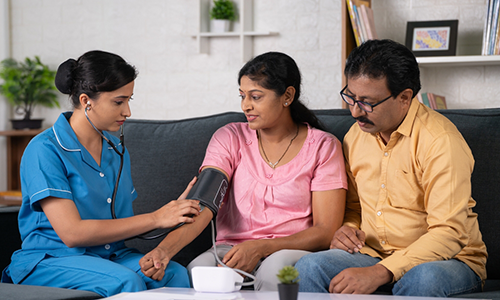Typhoid fever is a life-threatening and risky infection, which is caused by a bacteria namely Salmonella typhi. It is usually spread through the consumption of contaminated food and water or if you come in contact with an infected person. Once a salmonella typhi type of bacteria enters your body it will multiply in a short amount of time and spread across your bloodstream.
An unhygienic environment and climate change can add to an increase in cases of typhoid, locality that lack access to proper health care makes it easier for typhoid infections to spread to such communities that do not have safe drinking water and proper sanitation.
Signs and symptoms of typhoid:
A person who has typhoid infection and fever carries the salmonella typhi bacteria in their bloodstream and intestine. These salmonella bacteria are only found in humans.
These are some common symptoms of typhoid fever, such as:
- Prolonged high fever
- Nausea
- Headache
- Fatigue
- Diarrhea
- Constipation
- Abdominal pain
In some cases, people can have rashes also. Severe cases of typhoid can be life-threatening or can even cause death as well. Typhoid can be confirmed through widal tests or blood tests.
Typhoid is a serious concern for many countries, improving living conditions, access to better health care, access to safe drinking water, and introducing people to antibiotics are a few of the options to keep it under control. Millions of people suffer from typhoid worldwide and hundreds and thousands of lose their life as well.
The risk of this disease is higher in regions that lack access to safe drinking water, adequate sanitation, and proper drainage systems. Children are at higher risk of this infectious disease.
Typhoid test (widal test):
The widal test helps to detect typhoid fever in the body. The widal test is an advanced way to detect the antibodies produced by the patient’s body against the salmonella typhi bacteria that causes typhoid infection. In the patient’s body, it searches for the O and H antibodies. It is one of the ways to confirm the typhoid.
Treatment:
The only effective way to cure typhoid is by taking antibiotics. The most commonly used antibiotic is ciprofloxacin (Cipro). there are some other antibiotics as well which doctors may recommend but in case of pregnancy tell your doctor first hand.
Typhoid patients may have constipation and bowel problems, therefore it is important to keep yourself rehydrated and drink a sufficient amount of water.
People who travel a lot and to places where such cases are pretty normal should take care of these things-
- Vaccination
- Sanitation and hygiene
- Avoid meeting infected people
Prevention:
If you were typhoid is common, getting the vaccine is a better option to avoid typhoid fever. Try to avoid using untreated water, take care of sanitation and drink safe water, and avoid meeting involvement with an infected patient.
- Frequently washing your hands in warm, soapy water is the best way to keep yourself safe. Carry an alcohol-based hand sanitizer for times where water is not available for washing your hands.
- Try to avoid using untreated water as much as possible, if you are travelling to remote area where water is unhygienic and typhoid cases are common. Try bottled water. Carbonated bottled water is a better option than noncarbonated water.
- Avoid consuming raw vegetables and fruits because the chances of washing them in contaminated water are higher. So, wash them properly and peel them before eating if you can.
- Choose freshly cooked hot food over stored food, hot cooked meal is less risky than the uncooked or stored ones.
- If you are already infected then try to avoid preparing meals for everyone in the family and avoid physical contact as much as possible because they may get infectious bacteria from you.

















